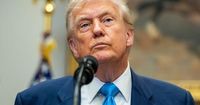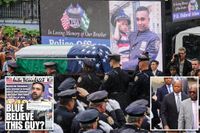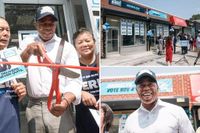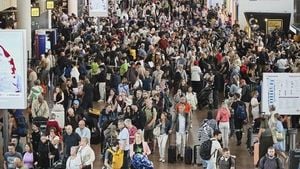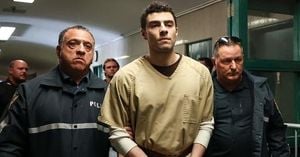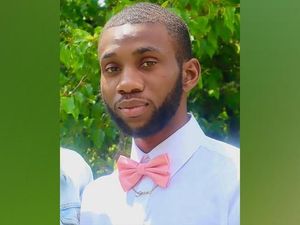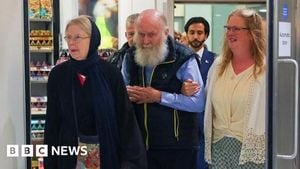On a hot August evening in New York’s Hamptons, former Governor Andrew Cuomo made his return to the city’s high-stakes political fundraising circuit. The event, held at the home of Seaport Entertainment Group’s general counsel Lucy Fato, marked Cuomo’s first major campaign fundraiser in the enclave since relaunching his bid for New York City mayor. The guest list read like a who’s who of the city’s business elite, many of whom are finding themselves caught between Cuomo and his chief rival, Mayor Eric Adams, as the two independents slug it out for both financial support and political momentum ahead of November’s election.
The stakes are unusually high this year. The city’s business community, traditionally a kingmaker in local races, is watching nervously as its preferred candidates split the vote, raising the specter that Democratic nominee Zohran Mamdani—an unabashed democratic socialist—could cruise to victory. According to Daily News, some power brokers like billionaire Bill Ackman, who once backed Cuomo with hundreds of thousands of dollars, have recently jumped ship to support Adams. Ackman’s defection, announced last month, was a blow to Cuomo, who is now working to shore up his war chest, which stands at around $1.1 million, compared to Adams’ formidable $4 million, not counting any outside super PAC spending.
Friday’s fundraiser, which began at 5 p.m., was more than just a social gathering; it was a litmus test for where the city’s moneyed class will place its bets. The invitation, obtained by Daily News, detailed contribution tiers: $2,100 for “host” status, $1,000 for “sponsor,” $500 for “supporter,” and $250 for “young professional.” Other hosts included longtime Cuomo confidant Jeffrey Sachs and dermatologist Macrene Alexiades. But, as Hank Sheinkopf, a veteran political strategist, told the Daily News, “Many of them are waiting for the sky to open up and tell them what to do because they have no idea what to do.” The uncertainty is palpable, especially as both Adams and Cuomo refuse to step aside, each determined to go the distance against Mamdani.
Cuomo, who resigned as governor in 2021 amid sexual and professional misconduct allegations (which he denies), has tried to broker a truce. He’s proposed that he and Adams agree to drop out and endorse whichever of them polls strongest in September, maximizing their chances to defeat Mamdani. But Adams, ever the fighter, has dismissed the idea outright, vowing to stay in the race regardless of the polls. This standoff has left the city’s business leaders in a quandary, worried that a divided centrist vote will hand City Hall to Mamdani.
The November ballot is a crowded one. Alongside Cuomo, Adams, and Mamdani, Republican Curtis Sliwa and independent Jim Walden are also in the running. But the spotlight—and the anxiety—remains fixed on the three frontrunners. As of early August, Mamdani is polling ahead, buoyed by a surge of matching funds from the city’s Campaign Finance Board (CFB). Just this week, he received another $1.7 million in public money, a windfall that further cements his status as the candidate to beat.
Meanwhile, Adams is facing his own set of challenges. On August 7, he cut the ribbon on his new Brooklyn campaign office, a modest space in Old Mill Basin, surrounded by supporters, former aides, municipal union reps, and even his brother Bernard. “Why Brooklyn?” Adams asked the crowd, “Because Brooklyn is the place I was born … it was the place that shaped and made me.” According to New York Post, Adams, who opted to run as an independent after skipping the Democratic primary, is undeterred by his recent setbacks. Despite being denied public matching funds by the CFB due to ongoing investigations into alleged 2021 campaign finance violations, and polling at just 7%—well behind both Mamdani and Cuomo—Adams remains resolute. He has opened his campaign to faith leaders and grassroots supporters, insisting he’ll fight to the finish.
Adams’ ongoing standoff with the CFB has become a central subplot in the race. The regulatory board has repeatedly barred him from the lucrative matching funds program, citing suspicions of campaign finance law violations and a lack of cooperation from his team. The mayor, for his part, maintains his innocence and points to the Department of Justice’s decision to drop his federal corruption case as vindication. Still, the CFB hasn’t budged, and Adams’ campaign must now rely on private donations and loyalists.
Cuomo, for his part, is recalibrating his strategy. After formally relaunching his independent bid in mid-July, he’s placed less emphasis on fundraising and more on retail politics—“pounding the pavement, meeting voters where they are and getting out the campaign’s policy agenda,” as a source close to his campaign told Daily News. Cuomo has hosted a series of policy-focused press conferences and is working to qualify for public matching funds, which he narrowly missed in the latest payout but expects to secure by late August. “There’s no question the money will be there to beat Mamdani,” the source added, “but right now the focus is on the ground game.”
Against this backdrop, Zohran Mamdani is carving out a distinct identity. In his first in-person interview since returning from Uganda, the 33-year-old Queens assemblyman and Democratic nominee for mayor outlined his vision for the city. Speaking to PIX11, Mamdani identified Cuomo, Adams, and Sliwa as candidates “supported or bailed out” by Donald Trump—a claim both Cuomo and Adams have denied. Mamdani, a democratic socialist, has made affordability the cornerstone of his campaign, proposing a $6 billion universal childcare plan and a sweeping $10 billion annual revenue boost through higher corporate taxes and city revenue measures.
Mamdani’s approach to public transit has also drawn sharp lines. He defends his free bus pilot, which he says most benefits low-income New Yorkers, and contrasts it with Cuomo’s more targeted transit subsidies for low- and middle-income residents. “This is for every New Yorker,” Mamdani told PIX11, “The mark of a successful public good is that everyone uses it, even those who can afford the private sector.”
Public safety is another flashpoint. Mamdani, who has faced criticism for past statements on police funding, now emphasizes a balanced approach—keeping police focused on criminal activity while reducing forced overtime. “I have said throughout this campaign, it is clear police are part of creating public safety, and we need not choose between those two things,” he said. When pressed on whether NYPD officers deserve a raise, Mamdani remained noncommittal, focusing instead on the need to address forced overtime and improve retention.
Mamdani’s rise has rattled the city’s political establishment. Many Democratic leaders remain on the fence, wary of his leftward tilt but unable to ignore his growing popularity. Mamdani himself is confident: “When we make buses faster, when we freeze the rent, when we deliver universal childcare, let that be an example of when Democrats actually get into office, deliver for working people.”
As the campaign barrels toward November, the city’s business leaders, political strategists, and everyday voters alike are left wondering: will the centrist vote coalesce behind Cuomo or Adams, or will Mamdani’s insurgent campaign pull off an upset? For now, all eyes are on the next round of polls—and the next big fundraiser.
The outcome could reshape not just City Hall, but the very future of New York politics.
